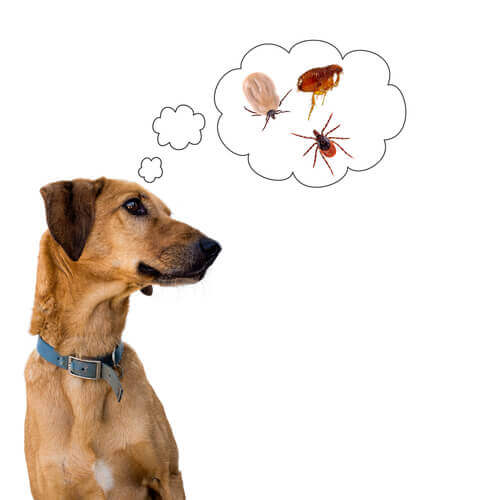Scientific Reasons Why Dogs Scratch Themselves

There are many scientific reasons why dogs might scratch themselves. The most common one is that they’re usually just trying to relieve an itch. However, you must watch them closely and try to figure out the reasons if it becomes too intense and compulsive.
Scientific reasons why dogs scratch themselves
Dog scratching and parasites
Parasites come in many sizes. Some you can see with your naked eye but others you would need a microscope to see. These creatures feed on the substances produced by living beings, whether they live inside them or on their surface. Many of them can cause considerable harm to a dog.
The most common organisms classified as parasites are ticks, fleas, and lice. These three parasites are often responsible for excessive scratching in dogs.
Ticks and fleas are hematophagous – this means they feed on animal blood. They don’t only suck an animal’s blood, but they can also transmit diseases.
Even though ticks are visible to the naked eye, and their heads must be removed with tweezers, this is not the case with lice and fleas. These latter ones are quite small and it isn’t easy to identify them just by their color or shape when they hide in a dog’s fur.
It’s for this reason that they’re currently one of the most likely causes of itching in dogs. So, the best way to keep them away from your furry animals is to periodically deworm them.
Your vet will recommend the most advisable products for your dog as there’s a wide variety of deworming treatments in the market.
Scientific reasons why dogs scratch themselves – allergies

Allergies are an immune process and express themselves through a variety of symptoms in response to the presence of a foreign antigen. Under normal conditions, this antigen or foreign substance shouldn’t alter body functions.
Sometimes, a body’s response to a foreign substance is an exaggerated inflammatory reaction. In fact, many existing allergies are the reaction to either a flea bite or to atopic dermatitis.
Flea bite allergies may lead to scab lesions in the abdomen, the rump and the inner and back parts of the thighs. In order to relieve a dog’s itch, your veterinarian may prescribe anti-inflammatories. They might also prescribe antibiotics to treat the lesions.
There are some anti-flea treatments that contain toxic chemicals and their mode of application is to spread them on the animal’s skin. However, these could be highly toxic to the animal. To prevent possible poisoning, you must keep the dog from licking their fur. Another way to deal with this problem is to use an oral flea treatment; there are many of them on the market.
Likewise, there are many other allergens that can lead to an itch on a dog; they could be environmental or food-related.
The measures you can take vary, depending on the type of allergy. If you’re dealing with a flea bite allergy, then you must deworm the animal. As for atopic dermatitis, you must first identify the allergen and try to eliminate it from the animal.
Diseases that lead to scratching in dogs

Scabies is an extremely contagious skin disease caused by various ectoparasites and mites. It’s also one of the most common diseases in dogs.
These mites transmit disease, usually by direct contact. The types of diseases vary depending on the type of ectoparasites a dog has.
There are times when a dog might scratch for no apparent reason and this might be the result of an autoimmune disease.
If you think this is the case, you must confirm it by consulting a professional. Only they can tell you what type of situation you’re dealing with and how to go about treating it.
The prevalence of parasites isn’t the same throughout the year, so you must also take this into account. The same goes for allergens as some of them aren’t around all year long.
So, in any of the above situations, you must consult a veterinarian to find out if your assumptions about why your dog is scratching so much are true. Prevention and deworming are the best cure.
All cited sources were thoroughly reviewed by our team to ensure their quality, reliability, currency, and validity. The bibliography of this article was considered reliable and of academic or scientific accuracy.
-
Cunliffe J. Whippet [Internet]. Editorial HISPANO EUROPEA; 2002. 163 p. Disponible en: https://books.google.es/books?id=D5ZUeGUIeosC&pg=PA127&dq=razones+por+las+que+un+perro+se+rasca+mucho&hl=es&sa=X&ved=0ahUKEwjvraP5q_jkAhWwyoUKHSd0A8wQ6AEIQTAE#v=onepage&q&f=false
-
MI PERRO SE RASCA MUCHO [Internet]. Purina® PRO PLAN®. [citado 30 de septiembre de 2019]. Disponible en: /consejos/perro-rasca-mucho.html